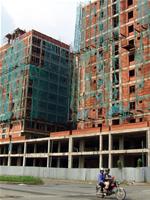Real estate developers have proposed a lot of measures to rescue them from incurring losses when the prices keep decreasing. They have urged banks to push up loaning and urged the state to set up assistance funds. They have also asked to use the idle capital of healthcare and social insurance funds to rescue the real estate market.
Is real estate market really freezing?
According to the HCM City Branch of the State Bank of Vietnam, the outstanding loans to the real estate sector by local banks have reached VND 61 trillion, accounting for 15% of the total outstanding loans in the locality.
By the end of October 2008, HCM City had still had 151 unfinished real estate projects. Banks have committed to loan VND 14.4 billion, and disbursed VND 9.3 billion, while VND 5.07 billion has not been disbursed yet.
The Governor of the State Bank of Vietnam, Nguyen Van Giau, affirmed that he has asked credit institutions to continue funding feasible real estate projects. This means that capital is still flowing into the real estate sector, and that the complaints by real estate developers, saying banks have turned their back on real estate projects, proves to be unreasonable.
In fact, a lot of real estate projects in HCM City have been implemented as previously scheduled, despite the material price increases at the moment, namely V-Star, Phu My, Phu My Thuan, Sky Garden, The Vista, or Sailing Tower.
Meanwhile, Nguyen Manh Ha, Head of the Housing Management Department under the Ministry of Construction, said that the prices have been falling only in the segment of luxury accommodations, while prices have not been falling in the segment of low cost houses (VND 10-15 million/sq m).
Secretary General of the HCM City Real Estate Association, Do Thi Loan, also said that the real estate market has never been frozen. It has just been witnessing a number of transactions fewer than in the fourth quarter of 2007.
No need to rescue real estate developers
Analysts have pointed out that real estate developers cried for help just to protect the benefit of real estate developers, investors, and speculators, while ignoring the benefit of the people.
Dr. Tran Du Lich, Head of the HCM City Economics Institute, said that those who should cry for help now are low income earners who cannot buy houses because of the skyrocketing prices, rather than the investors and speculators who pushed the prices up high at the end of 2007 and earned a lot of money from this.
In 2007, real estate firms reaped large sums of money from the real estate fever, and none of them said at that time that they wanted to put money into any funds. Now, when the prices have been dropping in value, they continuously urge to use the funds to save them from losses.
Doctor of Economics, Nguyen Quang Hung, said that Vietnam should learn the lesson from the US, where the money from pension and social funds was put into securities and real estate deals. He stressed that every fund serves its purposes, and that the money of the calamity prevention fund must not be used to rescue the real estate market.
Hung went on to say that instead of establishing the VND 10 trillion fund to help banks deal with bad real estate debts; it is advisable to use the sum of money to develop houses for low income earners.
At the international investment workshop held in HCM City in early November 2008, foreign economists also warned that if Vietnam just protects groups’ interests, much money will flow into the real estate market, which should be seen as a double-edged sword. They also said that Vietnam should let the ‘real estate bubble’ be filled out.

